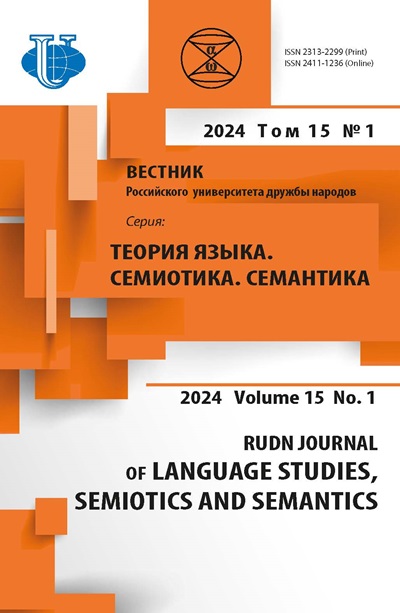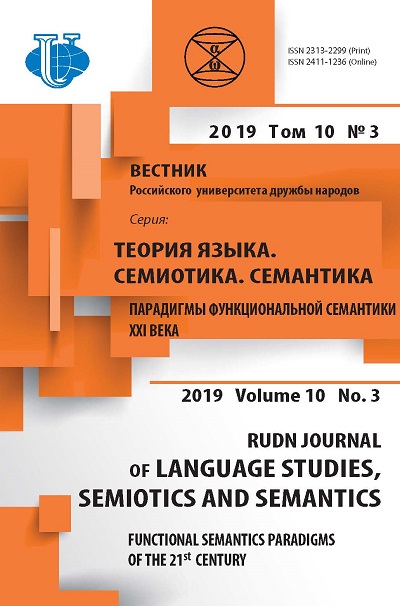Lexico-Semantic Transformations in Translation of Stories by V.M. Shukshin into English
- Authors: Vekovishcheva S.N1, Guseinova M.I1, Priorova E.M1, Savchenko E.P1
-
Affiliations:
- Moscow State Regional University
- Issue: Vol 10, No 3 (2019): Functional Semantics Paradigms of the 21st century
- Pages: 622-633
- Section: LEXICO-SEMANTIC TRANSFORMATIONS: FROM WORD TO TEXT ↔ FROM TEXT TO WORD
- URL: https://journals.rudn.ru/semiotics-semantics/article/view/22120
- DOI: https://doi.org/10.22363/2313-2299-2019-10-3-622-633
Cite item
Full Text
Abstract
This article is dedicated to the analysis of a lexico-semantic transformation in translation of fiction. The aim of the paper is to identify frequently and less frequently used translation transformations that we treat as cross-language transformations. These transformations are based on selection of the lexical units in target language closed in sematic meaning to those used in source language. V.M. Shukshin’s texts are used as the linguistic material for the conducted research. The translations are prepared by R. Daglish, L. Michael and J. Givens. The study shows that the most difficult units for translation are those having specific meaning due to cultural factors. Cultural associations in V.M. Shukshin’s texts are based on territorial and ethnographic information. Items actively participate in formation of the cultural code. They can be considered as a marker of cultural feature of a text. Translators’ functions include the pragmatic adaptation of texts and different comments. The phenomenon can be explained by the fact that the translator does not always possess enough background knowledge (as far as dialectal words are concerned) or in other words associative links between the object and the name it identifies. The results of the research explain the necessity of a new approach in professional practice.
About the authors
Svetlana N Vekovishcheva
Moscow State Regional University
Author for correspondence.
Email: vekovishcheva_sn@mail.ru
Vice Dean, Linguistic Faculty of Moscow Region State University, Ph.D., associate professor
Moscow, RussiaMaria I Guseinova
Moscow State Regional University
Email: svs353@yandex.ru
Assistant Professor, Assistant Professor of the Chair of Theory of Translation and Cognitive Linguistics, Linguistic Faculty
Moscow, RussiaElena M Priorova
Moscow State Regional University
Email: priorlin@mail.ru
Master of Linguistics, Assistant Professor, Assistant Professor of the Chair of Social Security, Life Safety Faculty
Moscow, RussiaElena P Savchenko
Moscow State Regional University
Email: ep.savchenko@mgou.ru
Associate Professor, Associate Professor of the Chair of Indo-European and Oriental Languages, Linguistic Faculty
Moscow, RussiaReferences
- Ahmanova, O.S. (1969). Dictionary of linguistic terms. Moscow: Sovetskaya ehnciklopediya. (In Russ.).
- Kazakova, T.A. (2000). Practical foundations of translation. English-Russia. Series: Study foreign languages. SPb.: Izdatel'stvo Soyuz. (In Russ.).
- Elistratov, V.S. (2001). Dictionary of Vasiliya SHukshin’s language. Moscow: Azbukovnik, Russkie slovari. (In Russ.).
- Shemchuk, Yu.M. & Maksimova, M.A. (2016). Connotative meamings of lexemes in literary texts and their translations, Philological sciences. Questions of theory and practice, 1(55), 193—195. (In Russ.).
- Latyshev, L.K. (1981). Translation course: Translation Equivalence and methods. Moscow: Mezhdunarodnye otnosheniya. (In Russ.).
- Interfaks [Electronic resource]. URL: http://www.interfax.ru/culture/537738 (accessed: 20.05.2018). (In Russ.).
- Shukshin, V.M. Stories [Electronic resource]. URL: http://lib.ru (accessed: 20.06.2018). (In Russ.).
- Dictionary of Semeiskie Old Believers’ dialect of Zabajkal'ye (1999), T.B. Yumsunova (Ed.). Novosibirsk: SO RAN. (In Russ.).
- Cambridge Dictionary [Electronic resource]. URL: http://www.cambridgedictionaries.com/ (accessed: 24.06.2018).
- Dictionary of Russian dialects of Novosibirsk Region (1979), A.I. Fedorov (Ed.). Novosibirsk: Nauka. (In Russ.).
- Edible mushrooms: classification, category, feature [Electronic resource]. URL: https://lastday.club/sedobnye-griby-klassifikatsiya/ (accessed: 24.06.2018). (In Russ.).
- Oxford University Press [Electronic resource]. URL: http://www.oxforddictionaries.com/ (accessed: 24.06.2018).
- Shukshin, V. Stories (the book for reading with English comments). Moscow: Russkij yazyk, 1984. (In Russ.).
- Svyatova, M.I. (2014). Figurativeness of culturaly marked vocabulary as specific marker of national mentalityin the Russian language. Vestnik MGOU. Ser.: Linguistics, 1, 62—68. (In Russ.).
- Dictionary of Russian dialects of Siberia: in 5 vol. (1999—2006). A.I. Fedorov (Ed.). Novosibirsk: Nauka. (In Russ.).
- Vekovishcheva, S.N. & Svyatova, M.I. (2014). Motivational relations of non-standard items in comparative aspect (based on material of English and Russian): Electronic journal Vestnik, 2 URL: https://evestnik-mgou.ru/en/Articles/Doc/571 (accessed: 18.06.2018). (In Russ.).
- Shukshin, V.M. Stories [Electronic resource]. URL: http://lib.ru (accessed: 20.06.2018). (In Russ.).
- Dictionary of Russian folk dialects: in 26 vol. (1965—1992). Moscow: Nauka. (In Russ.).













